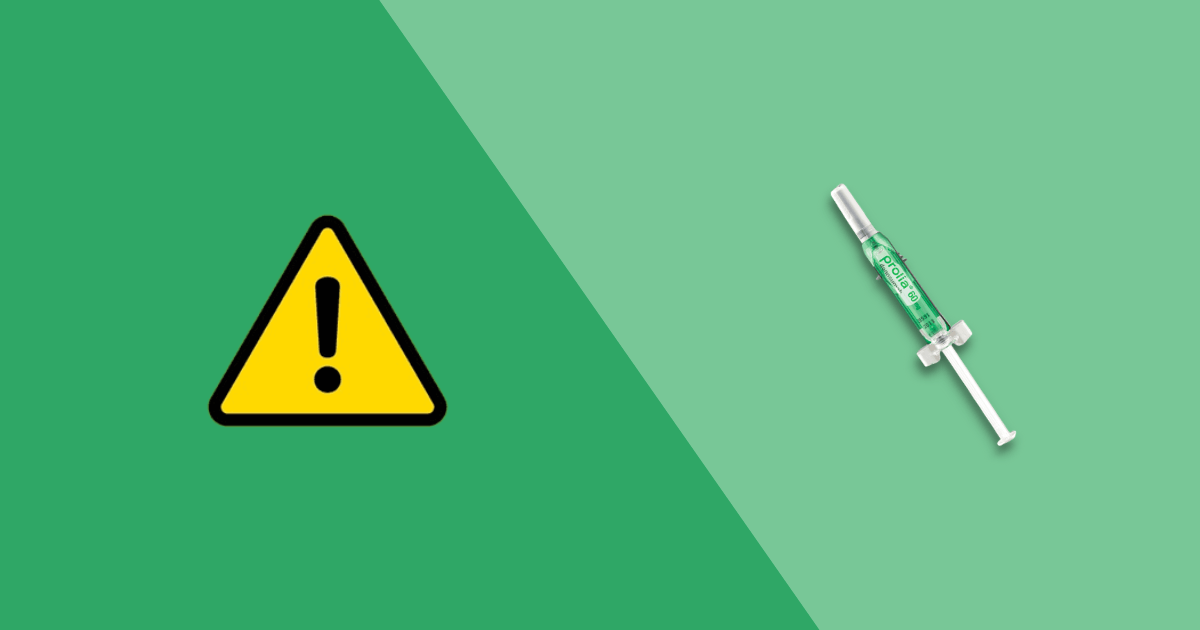Prolia side effects and how to avoid them
Table of contents
- What is Prolia (denosumab)?
- Prolia dosage
- Prolia side effects
- What is the best and safest treatment for osteoporosis in 2022?
- Switching from Fosamax to Prolia
- Which is safer Fosamax or Prolia?
- Is taking Prolia worth the risk?
- Is Reclast Better than Prolia?
- Is there a natural alternative to Prolia?
- Prolia drug interactions
- Prolia warnings & precautions
- How to avoid Prolia side effects
Prolia is an FDA-approved brand-name medication manufactured by Amgen Inc. and is used to treat osteoporosis and bone loss. While Prolia is generally well tolerated, there are some potential side effects that people should be aware of. The most common side effects of Prolia include bone and joint pain. Less common but more serious side effects can include serious allergic reactions.
Learn more about the side effects of Prolia and what you can do to avoid them.
What is Prolia (denosumab)?
Prolia is used specifically to treat:
- Postmenopausal osteoporosis in women who have a high risk of bone fractures
- Osteoporosis in men who have an increased risk of bone fractures
- Bone loss in women who are receiving adjuvant aromatase inhibitor hormone therapy for breast cancer
- Bone loss in men who are receiving androgen deprivation therapy (ADT) for prostate cancer
Prolia is not recommended to treat osteopenia. Osteopenia is a condition where your bones are not as strong as normal but not as weak as they would be if you had osteoporosis.
The active ingredient in Prolia is called denosumab. It helps counter bone loss and osteoporosis by reducing the rate at which your body loses bone tissue. Your body continually replaces old bone tissue with new bone tissue. Part of this process of bone turnover involves a protein called RANKL that helps produce a type of cell that breaks down bone. Denosumab works by blocking RANKL, stopping it from producing the cells that break down bone. This reduces the rate at which your body removes bone tissue, causing the bone mass to increase over time.
Prolia dosage
Prolia is available in solution form in the following doses: prefilled syringes containing 60 mg in 1 mL or single-use vials containing 60 mg in 1 mL.
Prolia is given by a healthcare professional as a subcutaneous injection every 6 months in the upper arm, upper thigh, or abdomen. Patients are advised to take calcium 1000 mg each day and 400 IU of vitamin D each day.
You are advised to read the medication guide provided with this medicine for the drug information and patient information, and always speak with your healthcare provider for medical advice about any changes to your dose so they can monitor and evaluate your condition.
Prolia side effects
The most common possible side effects of Prolia in clinical trials include the following:
- Arm and leg pain
- Back pain
- Bone pain and joint pain
- Muscle pain
- Hair loss
- Constipation, abdominal pain, flatulence
- Skin rashes and eczema
- skin problems such as dryness, peeling, redness, itching, small bumps/patches, or blisters
- Urinary tract infection
- Frequent and painful urination
- Blood in the urine
Prolia can cause more serious side effects, including:
- Serious allergic reactions: low blood pressure, shortness of breath, tightness in your throat, swelling in your face and throat, itchiness, rash
- Skin infections
- Other serious infections
- Jaw pain and jaw bone damage (osteonecrosis of the jaw)
- Low calcium levels in the blood. Prolia is recommended in combination with calcium and vitamin D supplements.
- Unusual fractures of the thigh bone
If you experience any of these serious side effects, stop taking Prolia and seek medical attention immediately. You are encouraged to report the negative side effects of prescription drugs to the FDA. Visit www.fda.gov/medwatch, or call 1-800-FDA-1088.
What is the best and safest treatment for osteoporosis in 2022?
Bisphosphonates such as Reclast, Fosamax, and Actonel (risedronate) are the first choice for osteoporosis treatment. Fosamax is taken as a once-weekly pill. Actonel is taken as a once-weekly or monthly pill. Reclast is given intravenously.
Switching from Fosamax to Prolia
Prolia is a monoclonal antibody that works with your immune system to prevent bone loss. Bisphosphonates (such as Fosamax) help increase the thickness of bone and prevent the breakdown of bone and has a different mechanism of action to Prolia. Discuss switching from Fosamax to Prolia with your doctor.
Which is safer Fosamax or Prolia?
Prolia and Fosamax have similar side effects. Like Fosamax, Prolia can cause osteonecrosis of the jaw and atypical fractures, and which of these two treatments is safest for you will depend on your medical condition and any other medicines you are taking. Speak to your doctor for medical advice.
Is taking Prolia worth the risk?
The National Women’s Health Network recommends that Prolia only be used as a treatment option in post-menopausal women suffering from severe osteoporosis or when other osteoporosis medications have not worked. Prolia has an extensive list of side effects. However, not all the side effects of Prolia from long-term use are known, and it is not clear if the benefits of using Prolia outweigh its risks.
Is Reclast Better than Prolia?
In studies, Prolia was seen to have a greater increase in spine bone mineral density/BMD (a measure of bone health) at 1 year than Reclast, but not significantly. Reclast also had a greater incidence of causing mild flu-like symptoms. Prolia is a relatively new medication, and patient numbers for the study were relatively low. Further studies are needed to investigate the efficacy of Prolia.
Is there a natural alternative to Prolia?
Alternative treatments for osteoporosis will depend on your age, sex, and the severity of your condition. Natural alternatives to Prolia include vitamin D supplements, dietary changes (such as avoiding fizzy drinks and caffeine), reducing stress, and a simple exercise plan.
Prolia drug interactions
Prolia can interact with other medications, including:
- Medications that contain the same active ingredient as Prolia (denosumab), like Xgeva
- Corticosteroids, like prednisone or dexamethasone
Before taking Prolia, be sure to tell your doctor about all of the medications you are taking to ensure they are safe to take at the same time.
Prolia warnings & precautions
Don’t take Prolia if you:
- Are allergic to the active ingredient denosumab
- Are allergic to any of the other ingredients in Prolia (these are listed in the leaflet which comes with the medication)
- Have low calcium levels in your blood (hypocalcemia)
- Are under 18 years of age
Talk to your physician before taking Prolia if you:
- Have low blood calcium levels (hypocalcemia)
- Have had thyroid/parathyroid problems
- Have stomach or intestinal problems
- Have cancer
- Have ever had severe kidney problems, kidney failure, or have been on dialysis
- Have poor dental health or any problems with your teeth or mouth, like gum disease
- Have had recent or planned dental procedures
- Are a smoker (this can increase the risk of dental problems)
- Have an allergy to latex (the cover of the pre-filled syringe contains a derivative of latex)
- Are pregnant or trying to become pregnant. If you can become pregnant, you should use an effective form of birth control
- Are breastfeeding or plan to breastfeed
You should always check with your healthcare provider before taking any medication, including Prolia, to make sure it is safe for you. Be sure to tell your doctor about all other medications you’re taking, including over-the-counter drugs, vitamins, and herbal supplements, as they can interact with Prolia.
How to avoid Prolia side effects
The best way to avoid side effects is to take Prolia as directed by your doctor. Follow your doctor’s instructions carefully, and do not take more or less than prescribed.
If you experience any side effects, talk to your doctor or pharmacist. They may be able to recommend ways to help reduce or prevent some of the side effects.
1. Stick to the recommended dosage
Take your prescribed dose of Prolia that has been recommended by your healthcare professional. Do not take more or less than prescribed.
2. Monitor your blood sugar levels
If you have diabetes, it is important to monitor your blood sugar levels closely while taking Prolia. Check your blood sugar levels as directed by your doctor and report any changes to your doctor immediately.
3. Drink plenty of fluids
Drink eight to 10 glasses of water or fluids every day to help prevent dehydration, which can make side effects worse.
4. Don’t skip meals
Eating regular meals and snacks will help to prevent low blood sugar levels (hypoglycemia).
5. Check your feet
If you have diabetes, check your feet for any cuts, sores, or redness regularly. Tell your doctor if you experience problems with your feet while taking Prolia.
6. Know the signs and symptoms of Prolia side effects
Signs and symptoms of side effects include joint and muscle pain. If you experience these symptoms, speak to your doctor for medical advice.
7. Tell your doctor about all medications you’re taking
Be sure to tell your doctor about all other medications you’re taking, including over-the-counter drugs, vitamins, and herbal supplements, as they can interact with Prolia.
8. Get regular medical checkups
It is important to get regular medical checkups and monitor your medical conditions. Your doctor will monitor your condition and may adjust your dose of Prolia as needed.
Medically reviewed
A medical professional has reviewed this article.


Jamie Winn, PharmD
Jamie Winn, PharmD
Dr. Jamie Winn received his Doctor of Pharmacy in 2002 from the University of South Carolina College of Pharmacy, Columbia, SC. Jamie is a medical reviewer for NiceRx.


